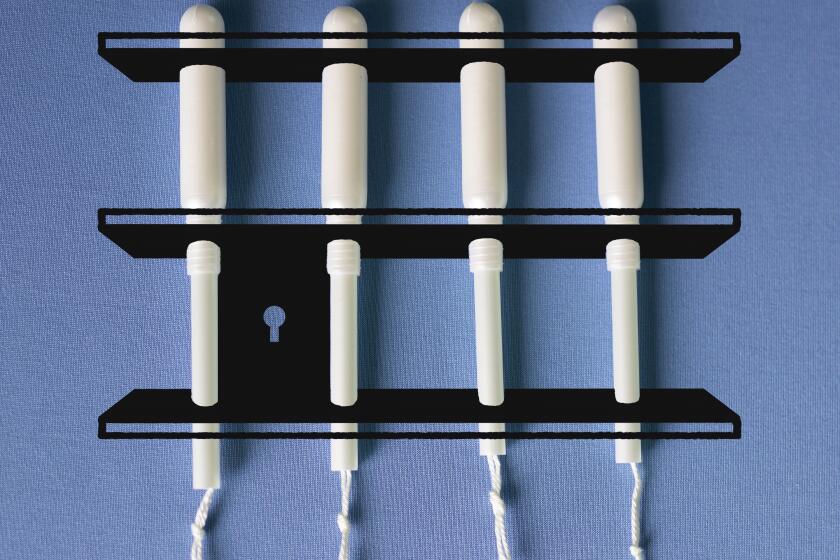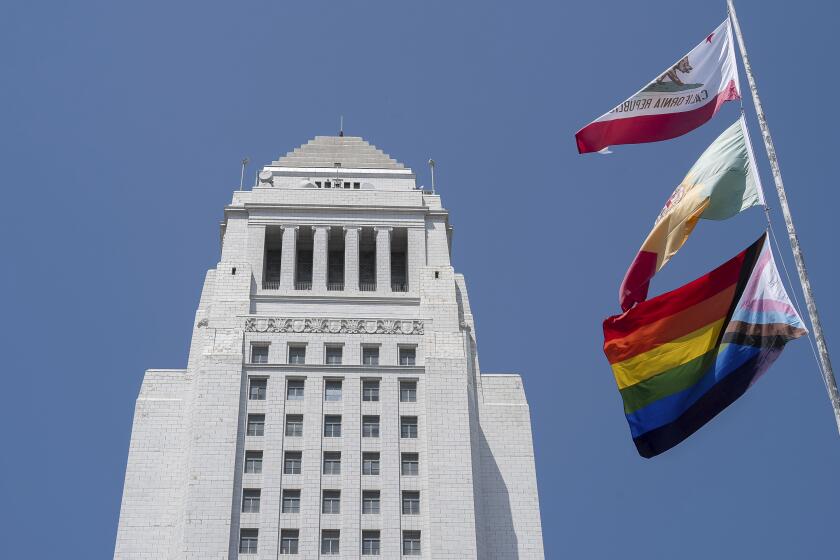
- Share via
California lawmakers passed roughly 1,200 bills last year, including some that resulted in unforeseeable wins by Republicans, promising protections for consumers and small strides for those in the entertainment industry.
In the end, Gov. Gavin Newsom signed about 84% of the bills he received. Many of those laws take effect today, Jan. 1, as California rings in a new year. Here are a few you should know heading into 2025:
Cannabis
Cannabis cafes are legal: You can now hang out at dispensaries like you would a restaurant or cafe, thanks to AB 1775. The new law brings an Amsterdam-style approach to marijuana use, by allowing cannabis retailers to make and sell food and nonalcoholic beverages at what will be known as cannabis cafes or lounges. Before this law, customers could smoke in some dispensaries but the businesses were only allowed to sell prepackaged snacks and drinks. Some who are concerned with the health component call the law a step backward, given the risks of secondhand smoke.
Cities will be able to issue permits that allow cannabis dispensaries to host live performances and serve hot food and nonalcoholic drinks.
Artificial intelligence
Actors are protected from AI imitations: It is now required to create a contract to specify the use of artificial intelligence to replicate an actor’s voice or likeness. Assembly Bill 2602 aims to protect performers’ and actors’ careers by preventing artificial intelligence from replicating their voice or likeness without permission. In the summer of 2023, actors’ and writers’ unions shut down Hollywood during a months-long strike, ultimately negotiating new contracts around the use of artificial intelligence in their industry. Last year, courts also began to question the business of selling deepfakes of celebrities’ voices and Scarlett Johansson raised concerns about an AI voice that sounded similar to hers.
Dead actors’ voices won’t be exploited: People will be subject to a $10,000 fine for using the voice of a dead actor or one that sounds like their voice without the consent of their estate. AB 1836 was sponsored by SAG-AFTRA and introduced in light of the advancements made in artificial intelligence that, the union said, can “easily clone human voices.”
Deepfakes with sexually explicit imagery are banned: Current revenge porn law is now expanded under SB 926 to prohibit the unauthorized distribution of artificially created sexually explicit images of a real person. The law applies specifically if there is intent to cause serious emotional distress to the person that is depicted in the image. Last April, Laguna Beach High School officials investigated a student who circulated AI-generated sexually exploitative images, and in Beverly Hills, a group of eighth-graders was expelled for their involvement in superimposing pictures of their classmates’ faces onto simulated nude bodies through artificial intelligence.
Social media platforms will make reporting deepfakes easier: Social media platforms are now required to have a reporting mechanism for users who are portrayed in a sexually explicit video or image without their knowledge thanks to SB 981. The Los Angeles District Attorney’s office, a sponsor of the bill, said that pornographic deepfakes are becoming a “growing threat” to adults and teens on social media.
Wages and Personal Finances
No more overdraft fees: State-chartered banks and credit unions are now barred under AB 2017 from charging overdraft fees, also known as nonsufficient fund fees, when customers try to make a withdrawal, purchase something on their debit card, or transfer payment but do not have enough funds and the transaction is declined. This was inspired by a similar proposal the Biden administration made early last year.
The minimum wage is going up: Workers paid the statewide minimum wage will get an annual increase to their hourly wages from $16 in 2024 to $16.50. This pay scale could vary depending on what city or county you are in and what industry you work in. The minimum wage for fast food workers is now $20 an hour and several cities, including Los Angeles, require minimum wages in other sectors that top $17 an hour.
Workers taking family leave will get more money: Workers who earn less than $63,000 a year will get 90% of their pay during leave to bond with a new baby or care for a sick family member, while workers making more than that will get 70% of their pay under SB 951, which passed in 2022. Previously, lower-paid workers were eligible for 70% of their pay during family leave, which made it impossible for many to take the time off, even though they were paying into the disability insurance system that covers the benefit. The new, higher replacement wage is paid for by all workers who pay into the state disability income program; they will have 1.2% of their pay deducted in 2025, up from 1.1% in 2024.
Housing
More time to respond to eviction notices: Tenants now have double the time to respond in writing to an eviction notice. The previous legal time to respond before legal action is taken was five business days, but it has now increased to 10 business days because of AB 2347. The bill’s author said giving tenants only five days to respond was “uniquely short” and could often result in a landlord winning a case, without the tenant getting a day in court. Extending the response time, the author said, allows tenants more time to seek advice, gather evidence and file an appropriate response.
Healthcare
Medical debt won’t be included in your credit score: Credit agencies can no longer include medical debt on people’s credit reports under SB 1061. An estimated 40% of Americans are burdened with some form of medical debt that they are unable to pay off. Advocates for this law argued that medical debt is a poor predictor of a person’s credit risk and can prevent individuals or families from finding housing, or getting employed, among other necessities.
Incarcerated women don’t need permission to obtain menstrual products: Women in prisons and jails now have full access to period-care products like pads and tampons under AB 1810. The law allows women to obtain those products without having to ask prison guards for permission, which has been tied to reports of sexual harassment.
One of the things Alissa Moore remembers clearly from her time in prison is how the guards taunted her when she asked for a tampon.
Education
Children will learn about pivotal California history: Public schools will now be required under AB 1805 to teach Mendez vs. Westminster, a 1947 court case involving a Mexican family from Orange County that fought to end segregation across California. The bill’s author stressed the importance of teaching students about this court case to help them “learn of the civil rights challenges faced by Mexican Americans in this state.”
Gender expression in schools: A first-in-the-nation law now bans school districts from requiring staff or teachers to disclose to parents if a student starts using a new pronoun or identifies as a different gender. AB 1955 will also protect school staff from retaliation if they refuse to notify parents of a child’s gender preference. The policy was introduced in response to more than a dozen conservative-led school board policies that required teachers to notify parents if their child changed their names or pronouns. The issue set off heated debates in the state Capitol and across school districts, as some parents felt outraged that the state wanted to keep parents in the dark, while LGBTQ+ activists said mandatory notification promotes an “unsafe” environment by forced outing of students.
The new law shields teachers from retaliation for supporting transgender students and prohibits school policies that require “forced disclosure” of youth gender decisions to their families.
Safety
Parking will get harder, and walking will get safer: California has stricter parking rules under AB 413. Police can now ticket drivers who park within 20 feet of the crosswalk, which is around the length of a car. Drivers must abide by these rules regardless if the curb is painted red. The purpose of the law is to increase pedestrian visibility at busy intersections. The law has technically been in effect since the start of 2024, but fines for violations will begin in January.
New laws to curb retail theft: Over the summer, the Legislature passed a sweeping package of 11 bills meant to address retail theft. Seven of them are now taking effect. Those include: retail stores can request restraining orders against people who repeatedly steal from their stores; prosecutors can coordinate and charge people with crimes across different counties and handle them in a single court and those who commit arson in the act of stealing will receive stiffer sentences. Read The Times’ extensive coverage of these new laws.
More to Read
Sign up for Essential California
The most important California stories and recommendations in your inbox every morning.
You may occasionally receive promotional content from the Los Angeles Times.














